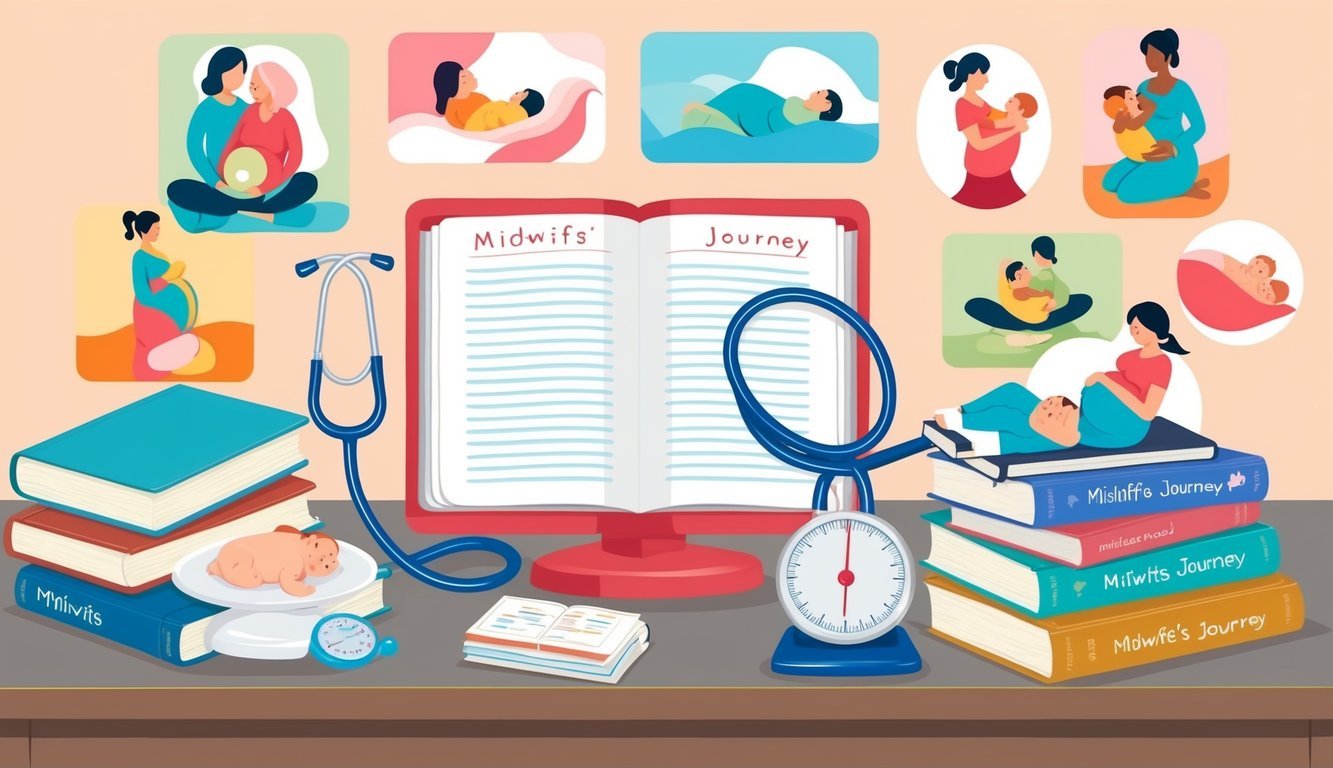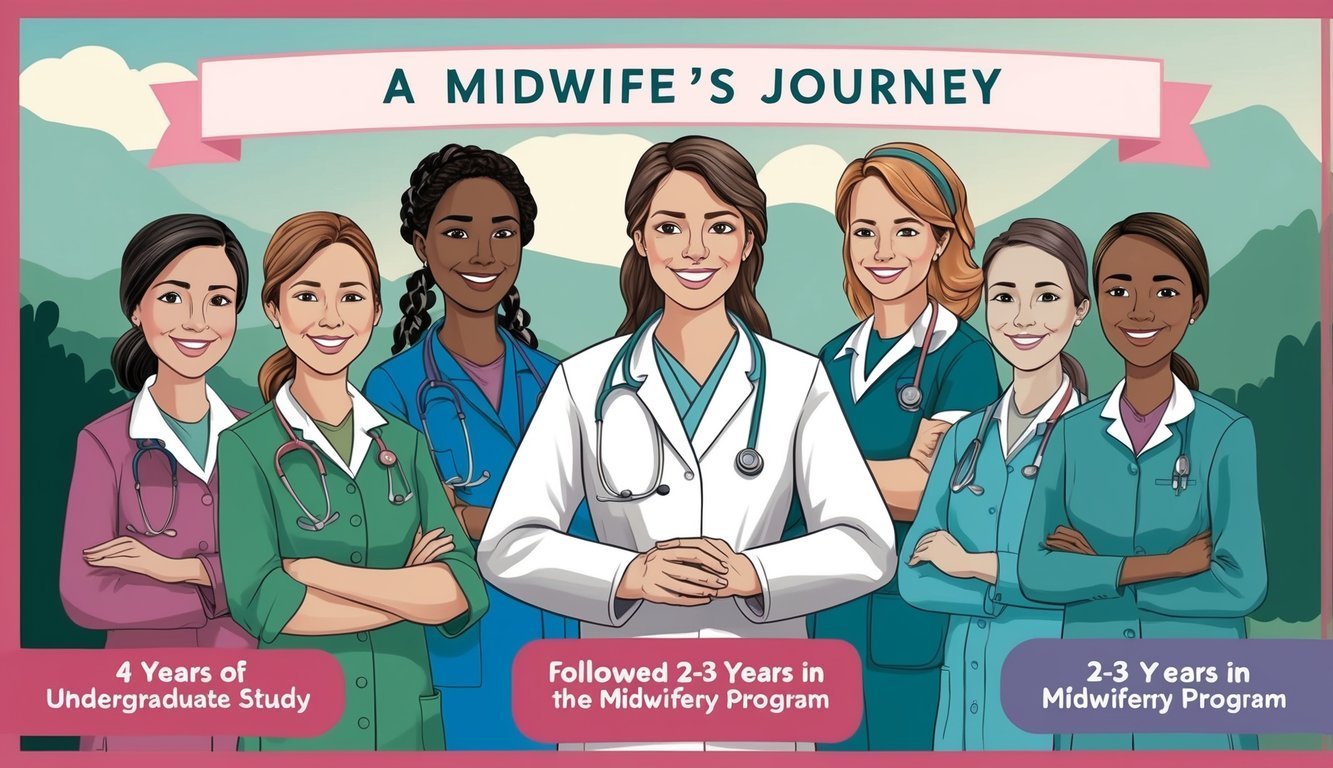Becoming a midwife is a rewarding journey that plays a vital role in healthcare. Typically, it takes between three to five years of education and training to become a midwife, depending on the pathway you choose.
As you explore your options, you will find that there are various routes to midwifery, including obtaining a degree in nursing or a specific midwifery program.
As a midwife, you will support women throughout pregnancy, childbirth, and postpartum care.
This career path offers a unique blend of clinical experience and opportunities for specialization.
Whether you aim to become a Certified Nurse Midwife or a Certified Professional Midwife, understanding the requirements can help you make informed decisions about your future.
Key Takeaways
- Midwifery programs typically require three to five years of training.
- There are different paths available for becoming a midwife.
- Midwives have diverse roles within the healthcare system.
Pathways to Midwifery

Becoming a midwife involves various educational routes.
The path you choose can impact your length of study and the credentials you earn.
Understanding these pathways can help you make informed decisions about your future in midwifery.
Nurse-Midwifery Education
If you pursue a Nurse-Midwifery education, you start by obtaining a nursing degree.
This can be either an Associate Degree in Nursing (ADN) or a Bachelor of Science in Nursing (BSN).
After you become a registered nurse (RN), you will need to complete a graduate-level program in nurse-midwifery.
Key steps include:
- Complete Nursing Education: Earn your ADN or BSN.
- Obtain RN Licensure: Pass the NCLEX-RN exam.
- Graduate Midwifery Program: Enroll in an accredited nurse-midwifery program.
- Certification: Successfully pass the CNM exam to become a Certified Nurse-Midwife (ACNM).
This pathway typically takes about 3 to 4 years after nursing school.
Direct-Entry Midwifery Education
If you choose Direct-Entry Midwifery, you may not need a nursing degree upfront.
Instead, you will enroll in a midwifery program that does not require prior nursing education.
This path leads to certification as a Certified Professional Midwife (CPM) or a Certified Midwife (CM).
The steps include:
- Enroll in a Midwifery Program: Look for programs that offer direct-entry options.
- Complete Clinical Training: Gain hands-on experience with pregnancy and childbirth.
- Certification: Take the necessary exams, such as the CPM exam.
Completing this route usually takes around 3 years, depending on the program.
You will gain essential skills and knowledge to provide safe care to mothers and newborns.
For more details, you can visit resources like Nurse Midwifery.
Accreditation and Certification

Understanding accreditation and certification is crucial in your journey to becoming a midwife.
This process ensures that you receive quality education and are qualified to practice safely.
Education Accreditation
To become a midwife, you must complete an accredited midwifery program.
The Accreditation Commission for Midwifery Education (ACME) accredits these programs, ensuring they meet national educational standards.
Programs may offer degrees such as a Master of Science in Nursing or a Doctor of Nursing Practice.
You can find accredited programs through resources provided by the American College of Nurse-Midwives (ACNM).
Enrollment in an ACME-accredited program prepares you for certification after graduation.
Many programs also incorporate clinical training, which is essential for gaining practical skills.
Certification Process
After completing your educational program, you will need to pass the National Certification Exam.
This exam is administered by the American Midwifery Certification Board (AMCB).
Passing the exam qualifies you as a Certified Nurse-Midwife (CNM) or a Certified Midwife (CM).
Once certified, you must also obtain licensure in your state.
Each state has specific requirements, which can include continuing education credits.
Your certification must be renewed periodically to maintain your license and ensure you stay updated with advancements in midwifery practices.
For comprehensive details on these requirements, refer to the AMCB’s guidelines.
Scope of Practice and Clinical Experience

Your journey to becoming a midwife involves understanding specific areas of practice and gaining hands-on clinical experience.
This includes engaging in supervised training and acquiring essential skills necessary for effective care.
Clinical Training and Rotations
As a midwife, you will undergo extensive clinical training that is critical for your practice.
This training usually takes place in various settings, including hospitals, birthing centers, and community clinics.
During rotations, you will work directly with patients in areas like:
- Labor and Delivery: Assisting during childbirth.
- Prenatal Care: Providing exams and education during pregnancy.
- Postpartum Care: Supporting mothers after delivery.
- Newborn Care: Assessing the health of newborns.
You will also learn about family planning and health education.
Clinical training typically combines both classroom learning and practical experiences that prepare you for real-life situations.
Core Competencies
In your training, you will focus on developing core competencies essential for midwifery.
This includes skills in maternity care, effective communication, and patient education.
Key competencies involve:
- Assessment: Conducting thorough prenatal exams.
- Care Management: Planning and providing care throughout pregnancy and childbirth.
- Problem Solving: Addressing complications and emergencies that may arise.
Understanding these competencies helps you provide holistic care to your patients and promotes their well-being.
For further information on becoming a midwife, you can visit resources like the American College of Nurse-Midwives.
Career and Specialization Opportunities

As a midwife, you have various career paths and specialization options available to enhance your practice.
Understanding these opportunities can help you tailor your career to your interests and community needs.
Nurse-Midwife Specializations
Certified Nurse-Midwives (CNMs) can specialize in different areas of midwifery practice.
Common specializations include:
- Women’s Health: Focuses on comprehensive gynecological care at all stages of life.
- Maternal-Fetal Medicine: Works with obstetricians to manage high-risk pregnancies.
- Community Health: Centers on improving health services in underserved populations.
Specializing allows you to provide specific healthcare services and support to diverse patient groups.
For more information on these specializations, visit ACNM – Become a Midwife.
Professional Development
Advancing your skills is crucial in the ever-evolving field of midwifery.
Opportunities for professional development include:
- Continuing Education: Attend workshops and training sessions on the latest practices.
- Certification Programs: Obtain credentials like Certified Professional Midwife (CPM) to expand your scope.
- Networking: Join professional organizations such as the American College of Nurse-Midwives for collaboration and support.
Investing in your professional growth enhances your ability to deliver quality healthcare services while connecting with other midwifery professionals.
This engagement is essential in building a successful career.
Financial Considerations

Becoming a midwife involves both educational investments and potential income.
Understanding these financial aspects can help you make informed decisions about your training and career path.
Educational Investments
To become a midwife, you will need to invest in your education.
The first step is earning a Bachelor of Science in Nursing (BSN), which typically takes four years.
After that, you’ll need a graduate-level program in midwifery, taking an additional two to three years for a master’s degree.
Tuition for nursing programs varies widely, often ranging from $5,000 to over $50,000 per year.
Community colleges and online programs may offer more affordable options.
Consider financial aid, scholarships, and student loans to help cover these expenses.
Also, think about the costs for books, clinical supplies, and licensing exams, which can add several thousand dollars more to your total investment.
Income Potential
The income potential for midwives can be quite rewarding.
According to recent data, the median salary for certified nurse-midwives (CNMs) is around $113,000 per year.
This can vary based on location, experience, and the specific healthcare setting where you work.
For context, registered nurses earn a median salary of about $77,000, which shows the financial advantage of further education in this field.
Labor and delivery nurses may earn between $65,000 and $90,000 annually, depending on their experience and region.
Working as a midwife can also offer flexibility in hours and practice settings, allowing for additional earning opportunities.
For further insights on salary data, you can refer to resources from the American College of Nurse-Midwives.
Frequently Asked Questions
This section addresses common questions about becoming a midwife, focusing on educational requirements, program duration, and certification.
You can find specific answers to each question to help guide your path toward a midwifery career.
What are the educational requirements to become a certified nurse-midwife?
To become a certified nurse-midwife, you need to complete a graduate-level nursing degree.
This degree must be accredited and often includes a Master of Science in Nursing (MSN) with a specialization in midwifery.
What is the duration of a midwifery degree program?
Typically, a midwifery degree program takes about 6 to 8 years to complete.
This timeline includes earning a bachelor’s degree in nursing followed by a graduate degree.
Is a nursing background mandatory for a career in midwifery?
Yes, a nursing background is usually required.
Most midwifery programs expect applicants to be registered nurses (RNs) before they can apply to midwifery education pathways.
How do you become a midwife in states with specific licensure requirements?
States can have unique licensure rules for midwives.
It’s important to research your state’s specific requirements and follow the application process laid out by your state board of nursing or midwifery.
What are the steps involved in becoming a midwife without a nursing degree?
If you don’t have a nursing degree, you could pursue a direct-entry midwifery program.
These programs equip you with the necessary skills and knowledge to practice midwifery directly.
What type of certification is needed to practice as a midwife?
To practice as a midwife, you must obtain certification from an accredited midwifery organization.
Many midwives are certified through the American Midwifery Certification Board (AMCB) or similar organizations in other countries.

